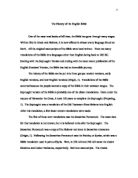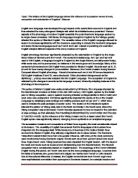Old English was originally written in the runic alphabet called the Futhorc. This originated from the 24 runes of Elder Futhark. It was written horizontally in either direction.
f u þ o r c ȝ w h
n i j eo p x s t b
e m l ŋ d œ a æ
y ea io cw k st g
The Alphabet was called the FUTHORC, named after the first six letters. Similarly the word ALPHABET is named after the Greek words Alpha +beta. Many of the letters in the futhorc clearly resemble the modern equivalent (b,r,f,t,p, and m). They are of similar shape to modern letters. The modern g appeared as ȝ, often called the “yogh”. The Modern “th” appeared as þ, called the thorn.
Unlike Modern English, there was no standardized spelling system and Old English lacked modern conventions like word spacing, punctuation, capital letters and line divisions. Old English spellings mirror pronunciation. Words are spelt phonetically. There were no silent letters like in Modern English’s “k” in “knight”.
An example of an Old English text is the story of Caedmon from Bede’s Ecclesiastical History of English People.
As you can see there are similarities in vocabulary, especially if you replace the unfamiliar letters with their modern equivalents.
þæt : replace the “þ” with “th” and “æ” becomes “a” , we get a modern English that.
A lot of Old English words are still used today or evolved into the words we use today. From the extract above, we can see:
he , was, his, reste, tide.
and other words that are not immediately recognisable:
onslepte – asleep
and in East Anglia, they call a “cattle-shed” a “neat-house” or “shippon” which have evolved from “neata scipene”.
Old English words were short, direct and forceful. Sentences were looser and the meaning of the sentence was not dependant on the word order. As in Latin, the Old English inflectional system gave” greater freedom of word-order than Modern English” Unlike Modern English, Old English was a language rich in morphological diversity. It had several distinct cases:
- Nominative.
- Accusative.
- Genitive
- Dative
- Instrumental.
Very few remnants of this survive in Modern English. Nouns adjectives and even the definite article were inflected for gender, case and number.
“ðoere ðeode” “ (of) the people” is feminine, genitive and singular.
“Angle” “Angles” is masculine, accusative and plural.
The system of inflections was more elaborate than Modern English yet we still retain some inflections but the form has changed. One common use of inflections today is adding “–s”to make a word plural.
Old English regular verbs show past tense by adding the suffix “ede”, “od” or “d” similarly to our Modern English “ed”. Another similarity is irregular Verbs in Old English also show past tense by changing the root vowel like our modern equivalent “drive”/”drove”.
Middle English
The period of Middle English is hard to define. The Normans invaded in 1066 and their French language impacted on English, but not immediately. The Middle English is said to begin about 1150. When the Normans conquered England, French became the language of power. French speaking barons, abbots and bishops were in place in superior roles in England. There was an influx of French merchants and craftsmen who crossed the border to take advantage of the commercial opportunity. Despite this invasion, the English language survived but was influenced greatly by the French. Perhaps 10000 words entered the language.The French words tended to be elegant for example “premier” compared to “first”. French was spoken the aristocracy and people of power so often English people became bilingual to gain advantages and cross the social divide. There was a great deal of intermarrying between the English and Norman French. In 1177 Richard Fitz Neal wrote:
“ Now that the English and Normans have been dwelling together , marrying and giving in marriage, the two nations have become so mixed that it is scarcely possible today, speaking of free men, to tell who is English, who of Norman Race.”
In about 1204, King John conflicted with King Phillip of France and the English nobility lost their estates and the status of French went into decline. There is a “dark age” in the history of the language as there is hardly any written evidence until the 13th century. French was the language of the government, law and administration. Latin was used by the Church in administration, education and worship.
Old English was not concerned with word order and had a lot of inflections. Middle English saw the decay of the inflectional system. This is thought due to the fact that the language became to be spoken differently and it became increasing difficult to hear them. Old English stressed the first syllable where the French stress the syllable equally. Middle English started to become concerned with word order as we are today. The French language influence made the language softer.
Historians and scholars believe that the Viking settlement created a pidgin- like variety which led to the loss of word endings and a greater reliance on word order.
The Chancery Standard was introduced during the reign of King Henry V. He wanted officials to speak English rather than Latin or Anglo- Norman. The standard was based on the dialect of London and East Midlands.
The six different forms of Old English disappeared except accusative. Consonants of Middle English became similar to ours today. Old English diphthongs’ became pure vowels and phonemes were lost, Morphology was affected as grammatical gender disappeared. Noun cases became possessive or non possessive as well as adjective infections disappeared.
Early &
Late Modern English
This period saw the introduction of printing. William Caxton chose to use the East Midland dialect in his printing. This became the accepted form of the language and saw the emergence of what we know as Standard English. The King James Bible and the works of Shakespeare were produced in this period.
The Great Vowel Shift saw the pronunciation of long vowels change to how we speak today. Early Modern English still had some unusual word order, Shakespeare’s plays contain “-est” “thou” and “-eth”.
Before this period, we had little or no punctuation or the use of capital letters that we use today. The modern punctuation system emerges during the Renaissance period. It was different to the rules we use today. They used the virgule similarly to the modern comma. The period (.) was used as we would use a comma. Inverted commas were introduced to appear like open direct speech. By the end of the Early Modern period, the modern punctuation had developed to what we use today.
This period also saw the disappearance of “ye”. It developed to the modern “you”. The use of “ye” and “thou” became restricted to religious or literacy contexts.
The language changed continually over this period. Shakespeare and Chancery are more different to comprehend than literature from the end of the 18th Century. For example Jane Austen’s work.
We still heard elements of Early Modern English are still heard in some dialects like “thee” and “thou” is still spoken in the Black Country.
In 1755, Samuel Johnson produced the first dictionary which standardized spellings and word meanings. Regional differences have lessened due to improved education and literacy.
English is constantly changing. Slang words, borrowing from other languages and countries like America enter our language all the time. Today’s technology allows us to connect to the world so all languages may influence tomorrow’s language.
Bibliography:
Crystal D (1998), “The Cambridge Encyclopaedia of the English Language”. Cambridge University Press, Cambridge.
Barber C (2003), “The English Language; a historical introduction”. Cambridge University Press.
Fitz Neal (1177), “ Dialogus de Scaccario / A dialogue of the Exchequer” .
Gardiner A (2003), “English Language AS & A2”, Pages 146-147. Published Pearson Education, Harlow, Essex.
Graddol D et al, (2001).”English, history,diversity and change”.. Routledge, New York.
Wikipedia (2009) accessed 13th March 2009,
Available from:
Gardiner A (2003), “English Language AS & A2”, Pages 160-161. Published Pearson Education, Harlow, Essex.
Crystal D (1998), “The Cambridge Encyclopedia of the English Language”, Page 8. Cambridge University Press , Cambridge.
Wikipedia (2009) accessed 13th March 2009,
Available from:
Graddol D et al, (2001).”English, history,diversity and change”. Page 111. Routledge, New York.
Barber C(2003), “The English Language; a historical introduction”. Page 118 . Cambridge University Press.
Crystal D (1998), “The Cambridge Encyclopedia of the English Language”, Page 30. Cambridge University Press , Cambridge.
Gardiner A (2003), “English Language AS & A2”, Pages 146-147. Published Pearson Education, Harlow, Essex.
Fitz Neal (1177), “ Dialogus de Scaccario / A dialogue of the Exchequer” .
Crystal D (1998), “The Cambridge Encyclopedia of the English Language”, Page 33. Cambridge University Press , Cambridge.
Gardiner A (2003), “English Language AS & A2”, Pages 146-147. Published Pearson Education, Harlow, Essex.
Crystal D (1998), “The Cambridge Encyclopedia of the English Language”, Page 68. Cambridge University Press , Cambridge.






